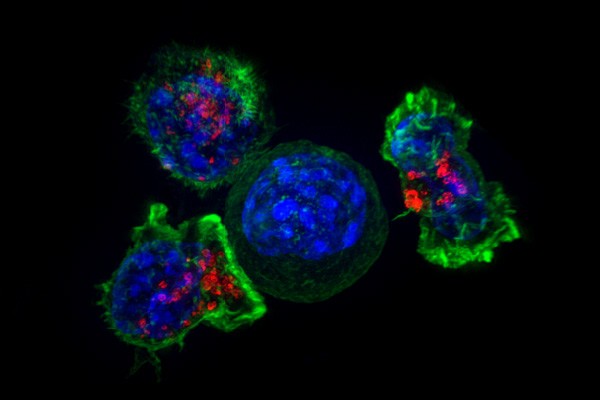CRISPR-Modified Cells Have Been Used in a Person for the First Time
A team of Chinese scientists has become the first to test CRISPR gene-edited cells in a human. The researchers, from Sichuan University in Chengdu, injected the cells into a patient with advanced lung cancer.
The experiment marks the beginning of an early stage clinical trial designed to test the safety of using CRISPR—a cheap, easy, and reasonably accurate way to edit DNA in living cells—to disable a gene in T-cells that suppresses immune response. According to Nature, which first broke the news of the trial, the injection went “smoothly,” and 10 patients are expected to receive injections.
Genetically modifying immune cells to turn them into cancer-hunters is a technology that’s now a few years old. Treatments remain experimental, though, and because their side effects can be fatal, messing with a patient’s immune system on the genetic level is only done for the sickest patients suffering from a limited subset of cancers.

But those techniques—in which immune cells are harvested from a patient, modified, and then returned to their body—involve adding a gene to give the cells a receptor that turns them into cancer-killers. Using CRISPR allowed the researchers to turn off a gene that codes for the PD-1 protein, which prevents the immune system from attacking cancer.
Human trials of CRISPR have been proposed in the U.S., including a scheme to knock out the gene behind PD-1—but so far none have been carried out.
Carl June, a researcher from the University of Pennsylvania who hopes to carry out some of the first such experiments in America, told Nature that he thinks the news could “trigger ‘Sputnik 2.0,’ a biomedical duel on progress between China and the United States.”
(Read more: Nature, “First Human Test of CRISPR Proposed,” “10 Breakthrough Technologies 2016: Immune Engineering”)
Keep Reading
Most Popular
Large language models can do jaw-dropping things. But nobody knows exactly why.
And that's a problem. Figuring it out is one of the biggest scientific puzzles of our time and a crucial step towards controlling more powerful future models.
The problem with plug-in hybrids? Their drivers.
Plug-in hybrids are often sold as a transition to EVs, but new data from Europe shows we’re still underestimating the emissions they produce.
Google DeepMind’s new generative model makes Super Mario–like games from scratch
Genie learns how to control games by watching hours and hours of video. It could help train next-gen robots too.
How scientists traced a mysterious covid case back to six toilets
When wastewater surveillance turns into a hunt for a single infected individual, the ethics get tricky.
Stay connected
Get the latest updates from
MIT Technology Review
Discover special offers, top stories, upcoming events, and more.